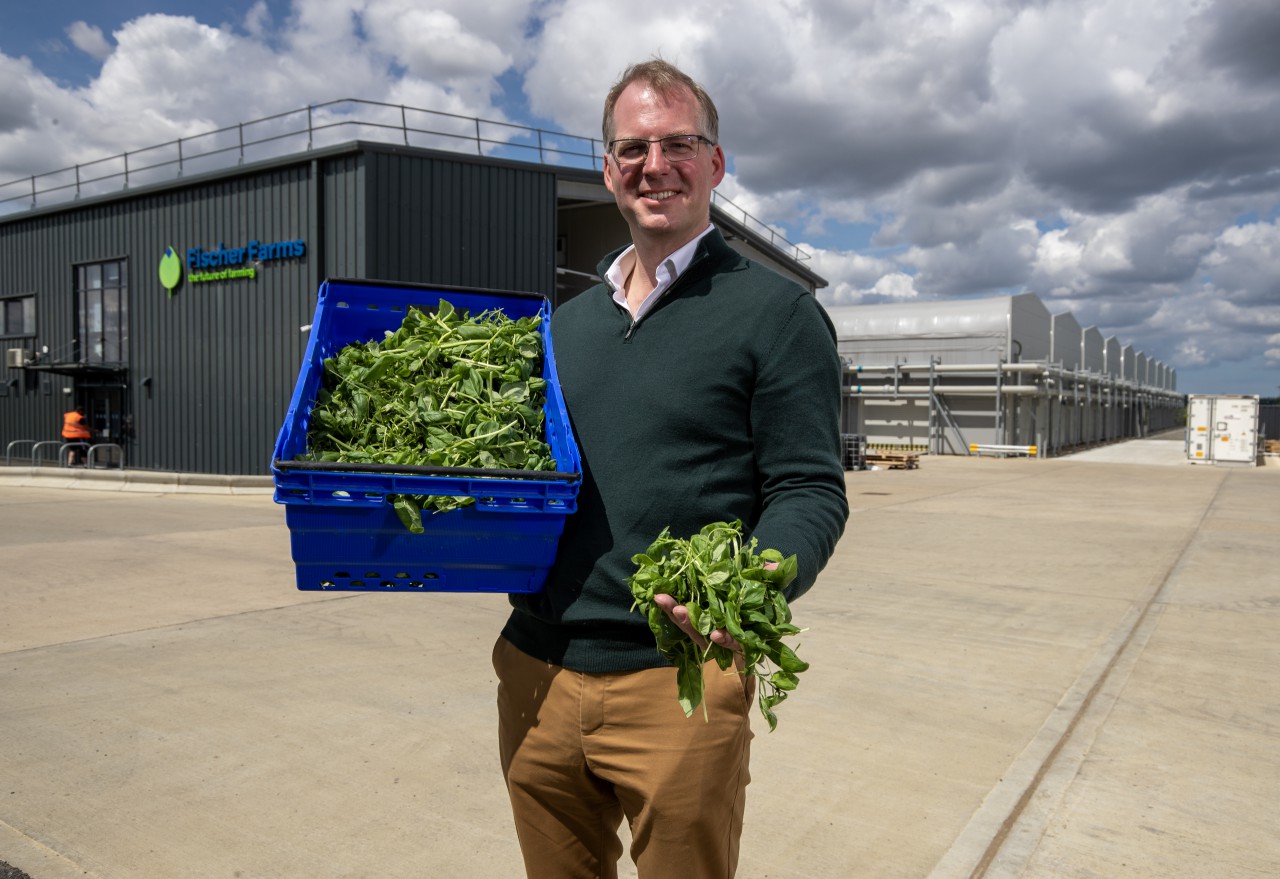
Did you know … all about Fischer Farms?
Fischer Farms has come a long way in the past six years. From starting life in a shipping container to recently opening one of the world’s largest vertical farms, we have scaled at pace as we continue our mission to build a more resilient, sustainable food supply chain.
We believe this smart approach to farming will revolutionise the way we produce food, but the vertical farming industry is still relatively new and unknown to many people. In our latest article, we share answers to the questions we get asked most about our work.
Why did you set up Fischer Farms?
Climate change and challenges facing traditional farming means food security is under increasing threat. We need to solve the problems of tomorrow, today, by offering stability in the food production industry.
Our founder and CEO, Tristan, is the green energy expert and visionary behind Fischer Farms. He began growing crops at home under his wife’s vanity table. He soon saw the potential to build a sustainable, and profitable business, that could do good for humanity.
In 2017, Tristan established Fischer Farms and began growing short leafy greens in a shipping container. From here, the business has grown significantly, and we have just opened our 4-acre farm in Norwich, which has 25,000m2 of growing space.
With over 20-years of experience in solving sustainability challenges, Tristan is now leading the way in sustainable food production. With a vision of transforming the future of farming through the latest vertical farming innovations, pioneering tech, and solar power, Tristan is set to achieve his ambition of delivering a scalable and more sustainable food production industry within the next decade.
What do you grow?
We currently grow short leafy greens, which include a variety of salads and herbs such as rocket, watercress, basil, and chives.
How much produce can you produce each day?
Our Farm in Norwich has enough capacity to supply 6.5 tonnes of leaf salad, leafy herbs and other fresh produce to supermarkets and food service customers every day.
How do you grow the crops without soil?
Our crops are grown in a stacked, biosecure, climate-controlled and fully automated system. We use environmentally friendly substrates and seed directly onto them in growing trays.
This technology-led environment operates 365 days a year, providing salad yields 250 times greater than conventional farms.
We use data analytics to optimise our fully automated growing, harvesting and reseeding systems, ensuring our crops receive the perfect mix of light, nutrients, and water to enable them to thrive.
We use energy-efficient LED lighting, which allows the lights to be placed very close to the plants, maximising space with tightly stacked layers.
Will you grow any other crops?
At Fischer Farms, our ultimate goal is to feed the world with nutritional, high-calorie foods, and we have a three-phase plan to achieve this.
Phase one, which is already underway in our production facility in Norwich, is leafy greens and herbs. Phase two is soft fruits, with trials underway at our R&D site in Lichfield.
Phase three is calorific staples, such as rice and wheat and protein staples, such as peas and soya beans. Our recent wheat trials have shown that this is possible, with a harvest cycle time capable of delivering five crop cycles per year. This means that we can grow the equivalent of 273 acres of conventionally grown wheat in a 10-acre vertical farm.
Further development of the seed, growing environment and light technology will continue to provide significant improvements to this performance. It is this drive to safeguard global food security that makes us unique. As we heavily invest in R&D to make this happen, we aim to lead the way for scalable vertical farming.
Do you use chemicals to produce your crops?
Our crops are grown without the use of chemicals, including pesticides, herbicides or insecticides.
Why is the product not organic?
Current UK and EU regulations mandate that ‘organic’ labels only grace produce grown in soil. As our produce is grown in a soil-free environment, we cannot secure organic accreditation.
However, our crops are grown in the safest, most sustainable manner, in a stacked, biosecure, climate-controlled and fully automated system.
What are the benefits of vertical farming?
More productive
Vertical farming enables us to be much more productive using less space. We can grow the same amount of food in our 4-acre indoor farm as 1,000 acres of traditional farmland, resulting in salad yields 250 times greater than conventional farming.
Consistent high-quality produce
Grown in a controlled environment, free from the use of pesticides, herbicides or insecticides. Producing our delicious fruits and vegetables in our innovative facility means we can harvest consistently high-quality produce 365 days a year.
Minimises Environmental Impact
Vertical farming is a closed system approach meaning there is no impact on the surrounding countryside from issues typically associated with traditional farming, such as topsoil erosion or chemical run-off. Vertical Farming operations also use significantly less water required for field-grown crops.
Reduce Food Waste
Grown in a bio-secure facility, our crops do not need to be washed, which retains nutrients and extends the shelf-life.
Slash food miles
We operate all year round, entirely independent of volatile weather conditions, providing retailers and packers with a stable supply of produce, eliminating the need to import goods from overseas decreasing transport miles and costs.
We hope that this article gives you an insight into the world of vertical farming and the possibilities it brings for food production. To find out more about the Fischer Farms story, watch our latest video on Linkedin.



